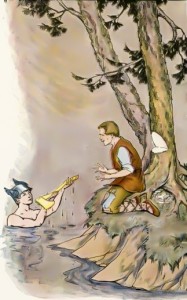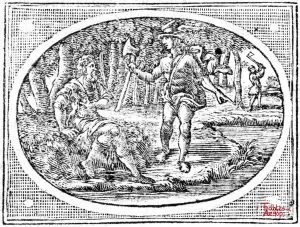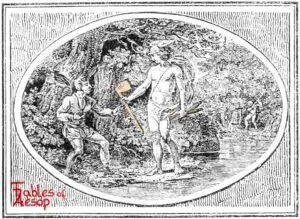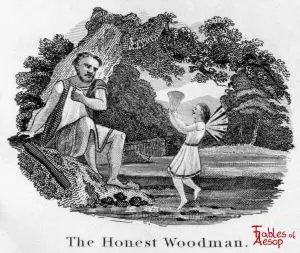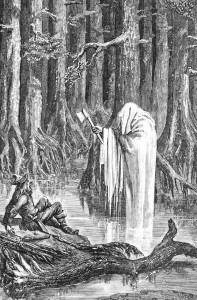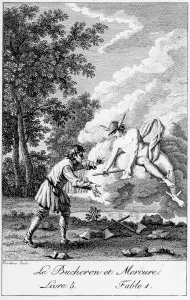A workman lost an axe. Mercury recovered a gold and silver axe which the workman refused. Mercury then recovered the real axe and gave him the others.
Truth is the better strategy.

Aesop For Children (Mercury and The Woodman)
A poor Woodman was cutting down a tree near the edge of a deep pool in the forest. It was late in the day and the Woodman was tired. He had been working since sunrise and his strokes were not so sure as they had been early that morning. Thus it happened that the axe slipped and flew out of his hands into the pool.
The Woodman was in despair. The axe was all he possessed with which to make a living, and he had not money enough to buy a new one. As he stood wringing his hands and weeping, the god Mercury suddenly appeared and asked what the trouble was. The Woodman told what had happened, and straightway the kind Mercury dived into the pool. When he came up again he held a wonderful golden axe.
“Is this your axe?” Mercury asked the Woodman.
“No,” answered the honest Woodman, “that is not my axe.”
Mercury laid the golden axe on the bank and sprang back into the pool. This time he brought up an axe of silver, but the Woodman declared again that his axe was just an ordinary one with a wooden handle.
Mercury dived down for the third time, and when he came up again he had the very axe that had been lost.
The poor Woodman was very glad that his axe had been found and could not thank the kind god enough. Mercury was greatly pleased with the Woodman’s honesty.
“I admire your honesty,” he said, “and as a reward you may have all three axes, the gold and the silver as well as your own.”
The happy Woodman returned to his home with his treasures, and soon the story of his good fortune was known to everybody in the village. Now there were several Woodmen in the village who believed that they could easily win the same good fortune. They hurried out into the woods, one here, one there, and hiding their axes in the bushes, pretended they had lost them. Then they wept and wailed and called on Mercury to help them.
And indeed, Mercury did appear, first to this one, then to that. To each one he showed an axe of gold, and each one eagerly claimed it to be the one he had lost. But Mercury did not give them the golden axe. Oh no! Instead he gave them each a hard whack over the head with it and sent them home. And when they returned next day to look for their own axes, they were nowhere to be found.
Moral
Honesty is the best policy.

Townsend version
A workman, felling wood by the side of a river, let his axe drop – by accident into a deep pool. Being thus deprived of the means of his livelihood, he sat down on the bank and lamented his hard fate. Mercury appeared and demanded the cause of his tears. After he told him his misfortune, Mercury plunged into the stream, and, bringing up a golden axe, inquired if that were the one he had lost. On his saying that it was not his, Mercury disappeared beneath the water a second time, returned with a silver axe in his hand, and again asked the Workman if it were his. When the Workman said it was not, he dived into the pool for the third time and brought up the axe that had been lost. The Workman claimed it and expressed his joy at its recovery. Mercury, pleased with his honesty, gave him the golden and silver axes in addition to his own. The Workman, on his return to his house, related to his companions all that had happened. One of them at once resolved to try and secure the same good fortune for himself. He ran to the river and threw his axe on purpose into the pool at the same place, and sat down on the bank to weep. Mercury appeared to him just as he hoped he would; and having learned the cause of his grief, plunged into the stream and brought up a golden axe, inquiring if he had lost it. The Workman seized it greedily, and declared that truly it was the very same axe that he had lost. Mercury, displeased at his knavery, not only took away the golden axe, but refused to recover for him the axe he had thrown into the pool.

Samuel Croxall (Mercury and the Woodman)
A MAN was felling a tree on the bank of a river, and by chance let his hatchet slip out of his hand, which dropt into the water, and immediately sunk to the bottom. Being therefore in great distress for the loss of his tool, he sat down and bemoaned himself most lamentably. Upon this, Mercury appeared to him, and being informed of the cause of his complaint, dived to the bottom of the river, and coming up again, showed the man a golden hatchet, demanding if that were his. He denied that it was. Upon which Mercury dived a second time, and brought up a silver one. The man refused it, alleging likewise that this was not his. He dived a third time, and fetched up the individual hatchet the man had lost; upon sight of which the poor wretch was overjoyed, and took it with all humility and thankfulness. Mercury was so pleased with the fellow’s honesty, that he gave him the other two into the bargain, as a reward for his just dealing. The man goes to his companions, and giving them an account of what had happened, one of them went presently to the river’s side, and let his hatchet fall designedly into the stream. Then sitting down upon the bank, he fell a weeping and lamenting, as if he had been really and sorely afflicted. Mercury appeared as before, and diving, brought him up a golden hatchet, asking if that was the hatchet he lost. Transported at the precious metal, he answered, yes; and went to snatch it greedily. But the god detesting his abominable impudence, not only refused to give him that, but would not so much as let him have his own hatchet again.
THE APPLICATION
Notwithstanding the proneness of mankind to do evil, and the account which some find in playing the knave, yet there cannot be invented a more true and reasoable [sic] maxim, than that by which we are assured that Honesty is the best Policy. If we consider it in respect to the other world, there never was a religion but strictly required it of its votaries: if we examine it upon account of this, we shall find that the honest man, provided his other talents are not deficient, always carries the preference in our esteem, before any other, in whatever business he thinks fit to employ himself.

Thomas Bewick (Mercury and The Woodman)
A Man was felling a tree on the steep bank of a river, and by chance let slip his hatchet, which dropt into the water, and sunk to the bottom. Being in distress for want of his tool, he sat down and bemoaned himself on the occasion. Upon this, Mercury appeared to him, and being informed of the cause of his complaint, dived to the bottom of the river, and coming up again, shewed the Man a golden hatchet, demanding if that were his? he denied that it was: upon which Mercury dived a second time, and brought up a silver one; the Man refused it, alleging likewise that it was not his: he dived a third time, and fetched up the individual hatchet the Man had lost; upon sight of which the poor fellow was overjoyed, and took it with all humility and thankfulness. Mercury was so pleased with his honesty, that he gave him the other into the bargain, as a reward for his just dealing. Away goes the Man to his companions, and giving them an account of what had happened, one of them went presently to the river’s side, and let his hatchet fall designedly into the stream. Then sitting down upon the bank, he fell to weeping and lamenting as if he had been really and sorely afflicted. Mercury appeared as before, and diving, brought him up a golden hatchet, asking if that were the hatchet he had lost? Transported at the precious metal, he answered yes, and went to snatch it greedily; but the God, detesting his abominable impudence, not only refused him that, but would not so much as let him have his own again.
APPLICATION.
Honesty is the best policy; and one of our best poets has further stamped a value upon the good old maxim, by his assertion that “an honest man is the noblest work of God.” The paths of truth and integrity are so plain, direct, and easy, that the man who pursues them, stands in no need of subtle contrivances to deceive the world. He listens to the honest monitor within, and makes good his professions with his practice: neither gold nor silver hatchets can make him deviate from it; and whatever situation he may be placed in, he is sure to meet the esteem of all men within the circle in which he moves, and has besides the constant pleasure of feeling self-approbation within his own breast.

Jefferys Taylor (The Honest Woodman)
A CERTAIN man—excuse, I pray,
Commencing in the dog-trot way;
For what, I ask, am I to do
When Aesop does not tell me who?—
This man, with many a hearty stroke,
Was cutting down an ancient oak;
When, as he smote, his axe’s head
Far from its handle quickly sped,
And, to the woodman’s great dismay,
Into the river found its way.
“Now tell us why,” the rustic cried,
“Ye could not on the stick abide?
You surely might have stay’d with me
At least till I had fell’d the tree.”
Thus did the man his thoughts express,
And sat him down in great distress;
But had not long reclined himself,
When there appeared a sprightly elf,
Who ask’d the reason of his grief,
And promised also quick relief.
The man explain’d, the sprite withdrew,
Intent his magic power to shew;
Forthwith he dived beneath the stream
Full many a fathom, to redeem
This woodman’s hatchet;—but behold!
He found one made of solid gold!
“Is this the tool you lost?” said he;
“O no, that ne’er belonged to me,”
The man replied: “Then,” said the sprite,
“I’ll try again to get the right.”
Once more he plunged: once more emerged,
And now a silver hatchet urged
On our poor rustic; but the clown
Too honest was e’en that to own;
“Well,” said the fairy, “I’ll persist
Till I procure the one you miss’d.”
Again withdrawn, again returned,
The man with joy his axe discern’d.
Said he, “Thou art a friend in need,
This is my very tool indeed!”
“Pray take it then,” the elf replied,
And gave the other two beside;
But ere the man found what to say,
The friendly sprite had flown away.
Meanwhile the man neglected not
To tell his neighbours what he’d got:
“Well,” said a friend, If that be true,
I’ll go and try what I can do.”
Then to the place an axe he took,
And soon he dropt it in the brook;
Then sat him down to mourn the same,
When, as before, the fairy came;
Who, finding how the matter stood,
Brought a gold-hatchet from the flood;
Then ask’d the man if that were his:
“O yes!” said he, “indeed it is:
That is the very self-same hatchet:”
Then tried with eager haste to snatch it.
But ere the gold was grasp’d by him,
The sprite return’d it to the stream.
“Oh!” said the rustic, “woe is me!
I ne’er again that axe shall see!”
“Nor yet your own,” rejoin’d the elf,
“Unless you make a plunge yourself.”
A maxim I shall now rehearse,
Which suits exactly with my verse;
That honesty is found to be
The best and wisest policy:
Although the crafty man disdains
The honest man as wanting brains.

JBR Collection (Mercury and The Woodman)
A Man felling a tree on the bank of a river, by chance let his axe slip from his hand. It dropped into the water, and sank to the bottom. In great distress at the loss of his tool; he sat down on the bank and grieved bitterly. Mercury appeared, and asked him what was the matter. Having heard the Man’s story, he dived to the bottom of the river, and bringing up a golden axe, offered it to him. The Woodman refused to take it, saying it was not his. Mercury then dived a second time, and brought up a silver one. This also the Man refused, saying that that, too, was none of his. He dived a third time, and brought up the axe that the Man had lost. This the poor Man took with great joy and thankfulness. Mercury was so pleased with his honesty, that he gave him the other two into the bargain. The Woodman told this adventure to his mates, and one of them at once set off for the river, and let his axe fall in on purpose. He then began to lament his loss with a loud voice. Mercury appeared, as before, and demanded the cause of his grief. After hearing the Man’s account, he dived and brought up a golden axe, and asked him if that was his. Transported at the sight of the precious metal, the fellow eagerly answered that it was, and greedily attempted to snatch it. The god, detecting his falsehood and impudence, not only declined to give it to him, but refused to let him have his own again.

L’Estrange version
A carpenter dropt his axe into a river, and put up a prayer to Mercury to help him to’t again. Mercury div’d for’t, and brought him up a golden one: but that was not it the fellow said: and so he plung’d a second time, and fetch’d up another, of silver. He sayd that was not it neither. He try’d once again, and then up comes an axe with a wooden handle, which the carpenter, sayd was the very tool that he had lost. Well! (says Mercury) thou art so just a poor wretch, that I’le give thee all three now for thy honesty. This story was got into every bodies mouth, and the rumour being spread, it came into a knaves head to try the same experiment over again. And so away goes he and down he sits, sniv’ling and whelping upon the bank of a river, that he had dropt his axe into the water there. Mercury, that was at hand it seems, heard his lamentation, and dipping once again for his axe, as he had done for the other; up he brings him a golden axe, and asks the fellow if that were it. Yes, yes, says he, this is it. Oh thou impudent sot, cryes Mercury; to think of putting tricks upon him that sees through the very heart of thee.
Moral
The great searcher of our hearts is not to be impos’d upon, but he will take his own time either to reward or punish.

de La Fontaine (Le Bûcheron et Mercure)
Votre goût a servi de règle à mon ouvrage:
J’ai tenté les moyens d’acquérir son suffrage.
Vous voulez qu’on évite un soin trop curieux,
Et des vains ornements l’effort ambitieux;
Je le veux comme vous: cet effort ne peut plaire.
Un auteur gâte tout quand il veut trop bien faire.
Non qu’il faille bannir certains traits délicats:
Vous les aimez, ces traits; et je ne les hais pas.
Quant au principal but qu’Esope se propose,
J’y tombe au moins mal que je puis.
Enfin, si dans ces vers je ne plais et n’instruis,
Il ne tient pas à moi; c’est toujours quelque chose.
Comme la force est un point
Dont je ne me pique point,
Je tâche d’y tourner le vice en ridicule;
Ne pouvant l’attaquer avec des bras d’Hercule.
C’est là tout mon talent; je ne sais s’il suffit.
Tantôt je peins en un récit
La sotte vanité jointe avecque l’envie
Deux pivots sur qui roule aujourd’hui notre vie:
Tel est ce chétif animal
Qui voulut en grosseur au boeuf se rendre égal.
J’oppose quelquefois par une double image
Le vice à la vertu, la sottise au bon sens,
Les agneaux aux loups ravissants,
La mouche à la fourmi; faisant de cet ouvrage
Une ample comédie à cent actes divers,
Et dont la scène est l’univers.
Hommes, dieux, animaux, tout y fait quelque rôle,
Jupiter comme un autre. Introduisons celui
Qui porte de sa part aux Belles la parole:
Ce n’est pas de cela qu’il s’agit aujourd’hui.
Un bûcheron perdit son gagne-pain,
C’est sa cognée; et la cherchant en vain,
Ce fut pitié là-dessus de l’entendre.
Il n’àvoit pas des outils à revendre:
Sur celui-ci rouloit tout son avoir.
Ne sachant donc où mettre son espoir,
Sa face étoit de pleurs toute baignée:
O ma cognée! ô ma pauvre cognée!
S’écrioit-il: Jupiter, rends-la moi;
Je tiendrai l’être encore un coup de toi.
Sa plainte fut de l’Olympe entendue.
Mercure vient. Elle n’est pas perdue,
Lui dit ce dieu; la connoîtras-tu bien?
Je crois l’avoir près d’ici rencontrée.
Lors une d’or à l’homme étant montrée,
Il répondit: Je n’y demande rien.
Une d’argent succède à la première:
Il la refuse. Enfin une de bois.
Voilà, dit-il, la mienne cette fois:
Je suis content si j’ai cette dernière.
Tu les auras, dis le dieu, toutes trois:
Ta bonne foi sera récompensée.
En ce cas-là je les prendrai, dit-il.
L’histoire en est aussitôt dispersée;
Et boquillons de perdre leur outil,
Et de crier pour se le faire rendre.
Le roi des dieux ne sait auquel entendre.
Son fils Mercure aux criards vient encor;
A chacun d’eux il en montre une d’or.
Chacun eût cru passer pour une bête
De ne pas dire aussitôt: La voilà!
Mercure , au lieu de donner celle-là,
Leur en décharge un grand coup sur la tête.
Ne point mentir, être content du sien,
C’est le plus sûr: cependant on s’occupe
A dire faux pour attraper du bien.
Que sert cela? Jupiter n’est pas dupe.

Mercurius et Lignator
Lignator quidam iuxta fluvium suam amisit securim et plorabat. Mercurius autem, miseratus hominem, urinatus in fluvium, auream sustulit securim et an haec esset quam perdiderat rogavit. Illo vero non eam esse dicente, iterum urinatus argenteam sustulit. Illo vero neque hanc esse suam dicente, tertio urinatus illam ipsam sustulit. Illo vero hanc vere esse deperditam dicente, Mercurius, probata ipsius aequitate, omnes ei donavit. Ille sociis omnia quae acciderant narravit. Quorum unus quidam, ad fluvium profectus, suam securim consulto demisit in fluvium et, plorans, sedebat. Apparuit igitur Mercurius et illi, et urinatus similiter auream securim extulit et rogavit an hanc amisisset. Illo cum gaudio et vere haec est dicente, perosus Deus tantam impudentiam, non solum illam detinuit sed ne propriam quidem reddidit.
Perry #173
